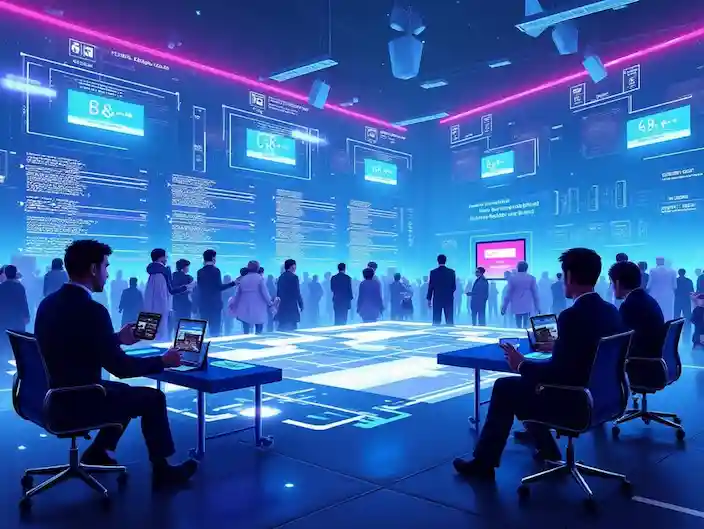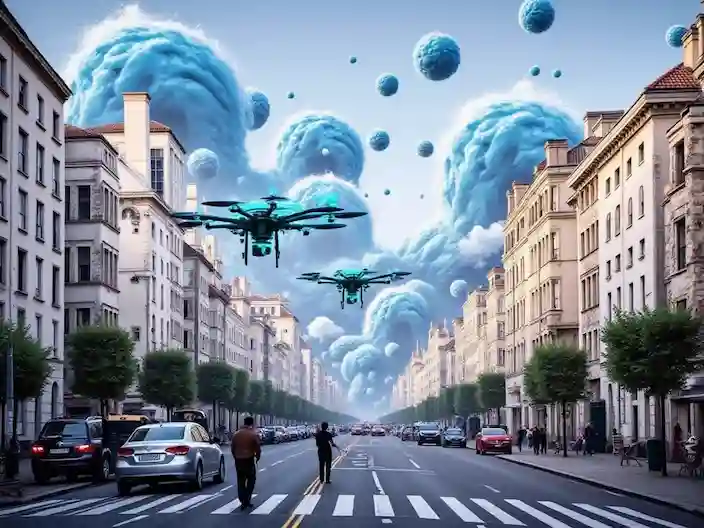Table of Contents
- Abstract
- Introduction
-
- The Need for Autonomous Systems in the Metaverse
-
- The Impact of Artificial Intelligence on the Evolution of the Metaverse
-
- The Role of Blockchain in the Decentralized Structure of the Metaverse
-
- Purpose of This Paper
- Metaverse and Autonomous Systems
-
- Metaverse: The Next Generation of Digital Interaction
-
- Key Features of the Metaverse
-
- Features of Autonomous Systems and Their Relation to the Metaverse
-
- Drawing Inspiration for the Metaverse from Autonomous Systems in the Real World
-
- The Connection Between the Metaverse and Autonomous Systems in Creating a Dynamic Digital World
- Applications of Autonomous Systems in the Metaverse
-
- AI in the Self-Organizing Metaverse
-
- Smart Digital Agents and Their Role in the Metaverse
-
- AI and Data Analytics in the Metaverse
-
- The Role of Blockchain and Smart Contracts in Autonomous Systems of the Metaverse
-
- The Future Path of the Self-Organizing Metaverse
Abstract
The metaverse, as a vast and complex digital space, requires systems capable of processing data automatically, making intelligent decisions, and managing user interactions. Autonomous systems in various fields such as robotics, the Internet of Things (IoT), artificial intelligence, and neural networks have developed self-organizing algorithms that can be applied to the metaverse. This paper analyzes the features of the metaverse and compares them with autonomous systems, offering solutions for developing a self-organizing metaverse.
Introduction
In recent decades, technological advancements in virtual reality (VR), augmented reality (AR), artificial intelligence (AI), and the Internet of Things (IoT) have led to the emergence of a new concept known as the metaverse. The metaverse, often referred to as the next generation of the internet, is a vast, dynamic digital ecosystem where users can interact in a 3D virtual space, manage their digital assets, and participate in a blockchain-based digital economy.
However, one of the main challenges of the metaverse is its management and sustainability on a large scale. As the number of users grows, a massive volume of data is generated and processed, requiring an automated, flexible, and scalable management structure. Traditional management systems that rely on centralized controls will no longer be able to handle this volume of interactions. As a result, there is an increasing need for a self-organizing metaverse capable of adjusting, managing, and optimizing itself without direct human intervention.
-
The Need for Autonomous Systems in the Metaverse
To address this challenge, autonomous systems and adaptive AI can serve as inspiration. Autonomous systems have been used in fields like robotics, self-driving cars, decentralized economies, and artificial neural networks. These systems can make decisions autonomously, learn from their environment, and respond to changes. Therefore, similar algorithms can be used in the metaverse to manage interactions, process data, allocate resources, and even create adaptive rules for users.

-
The Impact of Artificial Intelligence on the Evolution of the Metaverse
One of the most crucial technologies aiding the formation of a self-organizing metaverse is AI. AI-based systems can analyze user behavior patterns, adjust the environment according to their needs, and create smart digital agents to assist users. These technologies allow the creation of a dynamic, learning, and autonomous space in the metaverse, where digital environments evolve and adapt automatically.
On the other hand, machine learning (ML) and deep learning (DL) can process and analyze real-time data from the metaverse to personalize and optimize the user experience. For example, intelligent chatbots and virtual agents can assist users in their interactions and act as digital advisors in the metaverse.
-
The Role of Blockchain in the Decentralized Structure of the Metaverse
Another challenge in the metaverse is managing digital ownership and user financial interactions. Many metaverse activities rely on a digital economy, including transactions of digital assets, buying and selling NFTs, smart contracts, and cryptocurrencies. To create a transparent, secure, and decentralized financial structure, blockchain technology can play a key role.
Blockchain, through the use of smart contracts, can automate management processes and execute financial transactions without the need for traditional intermediaries. This enables users to interact within a self-organizing ecosystem, benefiting from higher security, transparency, and efficiency.
-
Purpose of This Paper
This paper, by examining the features of autonomous systems, machine learning, and blockchain, analyzes solutions for implementing a self-organizing metaverse. The key questions addressed in this paper are:
- How can the metaverse draw inspiration from autonomous systems?
- What technologies can help create a smart, dynamic, and self-organizing metaverse?
- What challenges exist in implementing a decentralized, self-organizing metaverse?
The results of this paper show that by using AI, autonomous agents, and blockchain systems, a metaverse can be created that makes independent decisions, optimizes itself, and uses data to enhance the user experience.

Metaverse and Autonomous Systems
-
Metaverse: The Next Generation of Digital Interaction
The metaverse is a rich, complex, and multi-layered digital ecosystem that integrates advanced technologies, enabling users to live in a fully interactive and connected virtual world. The metaverse can be considered an intelligent and dynamic environment managed through AI, blockchain, machine learning, and IoT.
Unlike traditional digital environments like social networks and online games, the metaverse is an always-active, autonomous virtual world that dissolves the boundaries between the physical and digital realms. Users can buy digital real estate, build their economy, develop their virtual personas, and even participate in decentralized work environments.
-
Key Features of the Metaverse
✅ Sustainability and Continuity: The metaverse is always active, with events and changes continuing even without the permanent presence of users.
✅ Real-time Interaction: Users can interact live with others through their digital avatars.
✅ Decentralized Digital Economy: There is the ability to buy, sell, and exchange digital assets through NFTs and cryptocurrencies.
✅ Autonomy: Environments, rules, and processes can be adjusted automatically and intelligently.
✅ Integrated Technologies: The metaverse combines AI, blockchain, AR, VR, and cloud computing.
To achieve self-organization and sustainability on a large scale, the metaverse requires systems capable of acting autonomously and managing its environment. This is where autonomous systems and digital agents come into play.
-
Features of Autonomous Systems and Their Relation to the Metaverse
Autonomous systems are systems that can make decisions, learn, and adapt to the environment without human intervention. These systems have been used in fields like robotics, self-driving cars, adaptive AI, and IoT, and can serve as the foundation for designing a self-organizing metaverse.
Key features of autonomous systems that can be applied to the metaverse include:
✅ Learning and Adaptability: Autonomous systems can collect data from their environment and identify behavioral patterns to continuously optimize themselves. This feature can be used in the metaverse to create more personalized and dynamic user experiences.
✅ Automated Decision-Making: Smart agents can control complex processes without human intervention. For instance, in the metaverse, a smart agent can adjust virtual land rental rates based on market demand or run algorithms to prevent illegal activities in the digital economy.
✅ Distributed and Decentralized Management: One advantage of autonomous systems is that management is done in a distributed and decentralized manner. In the metaverse, this could lead to economic independence, higher security, and reduced reliance on centralized controls.
✅ Interaction and Coordination Between Agents: In a self-organizing metaverse, autonomous agents can interact with each other, exchange information, and even execute complex processes such as processing smart contracts or enforcing social rules.

-
Drawing Inspiration for the Metaverse from Autonomous Systems in the Real World
Currently, many autonomous technologies have been successfully implemented across industries. The metaverse can draw from these examples to develop a self-organizing system:
🔹 Self-Driving Cars: These cars use AI and machine learning algorithms to make decisions under changing road conditions. The metaverse could use this technology to create automated transport systems in virtual cities or control data flow in distributed servers.
🔹 Internet of Things (IoT): IoT-connected devices can analyze data and provide intelligent responses without human intervention. In the metaverse, this capability could be used for smart management of digital assets, tracking user transactions, and automating virtual environments.
🔹 Industrial Robots: In factory production lines, autonomous robots perform complex tasks without direct supervision. The metaverse could adopt this model to create automated digital stores, smart virtual exhibitions, and personalized content production.
🔹 AI and Data Analytics: Advanced machine learning algorithms can process large volumes of data to identify user behavior patterns and provide personalized recommendations. This technology can be used in the metaverse to optimize ads, analyze user behavior, and deliver better experiences.
-
The Connection Between the Metaverse and Autonomous Systems in Creating a Dynamic Digital World
The metaverse is a fully dynamic, scalable, and limitless environment, but for effective operation, it requires infrastructure that can manage changes autonomously. Autonomous systems can optimize the management of data, economy, and social interactions within the metaverse.
In the future, a self-organizing metaverse may include:
✔ Smart virtual cities that adapt their own rules
✔ Digital agents providing customer services
✔ Decentralized economic systems operating without human intervention
✔ Automated cybersecurity detecting and mitigating threats

Applications of Autonomous Systems in the Metaverse
Autonomous systems can play a role in various dimensions of the metaverse, acting as smart agents, rule regulators, data analysts, facilitators of social interactions, and even economic managers. By leveraging AI, machine learning, IoT, and blockchain, these systems can transform the
This is a detailed exploration of AI and autonomous systems in the Metaverse. Here’s a breakdown of the key points from the content:
-
AI in Self-Organizing Metaverses:
AI can function as the brain of a self-organizing Metaverse, handling various tasks like data processing, management, and analytics automatically. Key uses include:
-
- User Data Analysis & Personalization: AI processes user data to identify behavior patterns and adjusts the environment based on their needs.
- Smart Recommendations: Personalized suggestions for shopping, events, or interactions with others.
- Content Management: AI tailors content based on users’ preferences, demographics, and interactions.
- Guiding Users in Complex Environments: AI-driven bots or agents can help users find locations or events of interest in vast Metaverse spaces.
- User Data Analysis & Personalization: AI processes user data to identify behavior patterns and adjusts the environment based on their needs.
-
- Natural Language Processing (NLP) & Human-Machine Interaction:
- Autonomous Virtual Assistants: Advanced chatbots guide users through the Metaverse.
- Cross-Language Communication: AI can provide real-time translation, breaking down language barriers.
- Intelligent Security & Privacy Management:
- Fraud Detection: AI tracks suspicious transactions and detects illegal activities in Metaverse economies.
- User Data Protection: Advanced encryption and blockchain ensure the security of users’ digital assets.
- Natural Language Processing (NLP) & Human-Machine Interaction:
-
Smart Digital Agents in the Metaverse:
Digital agents in the Metaverse act as intelligent artificial users performing various tasks like managing the digital economy, overseeing social interactions, and enforcing smart laws.
-
- Autonomous Digital Economy:
- Smart Financial Agents: Automatically adjust pricing, taxes, and digital resource distribution.
- Autonomous Marketplaces: AI adjusts supply and demand of digital assets.
- Smart Contracts Management: AI and blockchain automate the execution of financial and ownership contracts without intermediaries.
- Monitoring Social Interactions & Enforcing Laws:
- Behavior Detection & Prevention: Digital agents can detect inappropriate or unlawful behavior and take action.
- Event & Meeting Management: Autonomous agents manage virtual conferences or social gatherings.
- Autonomous Digital Economy:
-
AI & Data Analytics in the Metaverse:
AI processes big data to make complex decisions and optimize digital workflows.
-
- Sentiment Analysis & User Behavior Recognition:
- User Sentiment Understanding: AI analyzes textual and vocal data to improve social interactions.
- Predicting User Needs: AI anticipates and responds to user needs even before they are expressed.
- Machine Learning for Interaction Enhancement:
- User Behavior Mapping: Machine learning models improve user experience by analyzing behavioral patterns.
- Optimizing Recommendation Systems: AI boosts recommendation systems for advertisements, digital purchases, and social interactions.
- Sentiment Analysis & User Behavior Recognition:

-
Blockchain & Smart Contracts in Autonomous Metaverse Systems:
Blockchain is key to enabling decentralized, self-organizing Metaverse infrastructures.
-
- Security & Transparency in Transactions:
- Immutable User & Digital Asset Data: Blockchain prevents fraud and theft by securely recording data.
- Transparent Digital Contracts: Blockchain-based smart contracts ensure security and trust.
- Autonomous Economic Systems:
- Smart Digital Banks: Digital banks operate without human intermediaries to manage loans and payments.
- Smart Tokens: AI algorithms adjust the value of digital assets through tokenization.
- Security & Transparency in Transactions:
-
The Future of Autonomous Metaverses:
Self-organizing Metaverses will require systems that can independently manage environments and optimize user interactions.
-
- AI & Digital Agents: These technologies will transform the Metaverse into an autonomous, scalable ecosystem.
- Blockchain & Smart Contracts: These will secure the digital economy and enhance trust.
- Big Data Analytics & Machine Learning: These technologies will create smarter, personalized environments in the Metaverse.
- AI & Digital Agents: These technologies will transform the Metaverse into an autonomous, scalable ecosystem.
Table of Contents
Toggle


One Response